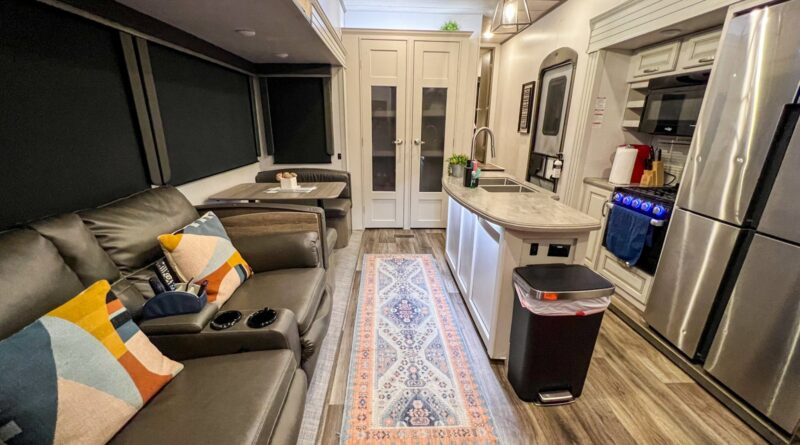How to rent an RV: What it costs and what to know before you book – The Points Guy
Campgrounds are a travel culture and an experience all their own. They harken back to a 1950s style of life, encouraging kids to spend the bulk of their time outside riding bikes and scooters, running around on playgrounds, hanging at picnic tables and playing on volleyball courts.
There’s a community that makes you want to wave to others as they go by and become (temporary) neighbors and friends. The conversations are long, the sleep is deep and the odds of truly relaxing are high, even without elements of pampering sprinkled in.
While I’m far from outdoorsy, it’s a lifestyle I can fully appreciate at least once every few years. You will likely never find me in a tent, though, and the odds of me investing a ton of money into a camping trip on an ongoing basis are low since I don’t regularly partake in this type of travel.
So, how can someone like me get their camping fix without dropping a ton of cash or making major sacrifices to travel preferences?
Enter: RV rentals.
Renting a recreational vehicle makes it possible to have a taste of the campground experience with all the conveniences of an RV (think: air conditioning and extra square footage) but none of the ongoing costs, commitment or knowledge required to actually own — or even operate — one.
With a couple of RV rentals under my belt, it’s safe to say I now understand just how nice they can be. Based on my firsthand experience, here’s what you’ll want to keep in mind as you consider renting an RV.
Related: Going on a road trip? Take these credit cards with you
Types of RVs
Before you rent an RV, you’ll need to decide on the type of RV that makes the most sense for your trip.

Daily Newsletter
Reward your inbox with the TPG Daily newsletter
Join over 700,000 readers for breaking news, in-depth guides and exclusive deals from TPG’s experts
While there are several kinds of RVs, the common rental types include:
- Class A: These are the huge RVs that resemble tour buses. They are often built on a bus chassis and are driveable without any towing vehicle required. The size and convenience come at a cost, though, as these RVs are often the most expensive.
- Class B: These RVs are typically camper vans or other types of driveable converted vans. They’re typically some of the smallest options available, though you can still drive them without a towing vehicle.
- Class C: These RVs are also driveable and fall between Class B and Class A vehicles in terms of size. They are often bigger than a Class B RV but smaller than a Class A RV. In terms of design, they generally look like campers built on top of big trucks.
- Fifth wheels: Named after the type of hitch and attachment used to tow them, these RVs require towing as they are not driveable by themselves. They are often quite large at 20 to 45 feet in length but can be more economical than a large Class A vehicle since they aren’t driveable on their own.
- Campers and trailers: Similar to fifth wheels, campers and trailers also need to be towed but are typically smaller (and potentially cheaper). They have a different type of tow attachment than a fifth wheel.
Note that despite what the names may suggest, the letters for class-designated vehicles do not go in order of size, so check the various types carefully to decide which will work best for you. Some rental types require towing while others don’t, so pay attention to the fine print for the vehicles you consider to make sure you have what you need if you choose a vehicle that cannot move on its own.
How to rent an RV
Similar to how there are large established platforms for renting homes that provide some built-in protections and a wide variety of choices, there are companies that offer various options for renting RVs.
Three of the main RV rental sites include:
If you are renting in a spot where RV rentals are common, such as at Disney’s Fort Wilderness Resort & Campground, chances are you’ll also find a number of established smaller companies with a fair amount of local RV rental inventory.
The process to rent an RV on the larger sites is much like it is with a vacation rental. You start by browsing and sorting through the options available for your dates, then narrow down your choices based on RV type, the photos you like, price and other factors. Once you’ve found the right RV for your trip, expect to put down a deposit to hold the vehicle. As your trip approaches, you’ll then need to submit your full payment via the booking platform you used by the due date noted in your reservation.
How much does it cost to rent an RV?
The purchase price for an RV ranges from $10,000 to well over $100,000, depending on what features you want and whether the vehicle needs towing or can be driven on its own.
As such, renting an RV is significantly cheaper, though rental prices also vary greatly based on a few primary variables.
- Type of RV
- Size and age of the RV
- Length of your rental
- If you want it delivered and set up for you
- Specific dates and location of your stay
Keep in mind that the price listed per night on a rental website is often well below the full amount due. So, for example, a large RV listed for $239 per night could easily cost closer to $400 per night once the various fees for rentals are added in.
Extra charges that may be tacked onto the cost of your RV rental include:
- Delivery fee
- Prep/cleaning fees
- Required insurance coverage fees
- Service fee
- Taxes
- Mileage fees
- Setup fees
To cut down on the number of fees added to your reservation, you can choose to pick up your RV and set it up yourself. Know, though, that this could be daunting to do for a first-timer, so do your homework first to decide if the savings are worth the extra time involved.
Related: I love luxury hotels but rented an RV and lived to tell the tale
Do you need special insurance or licenses to rent an RV?
If you plan on driving or hauling your RV rental, you’ll need to consider the licenses and insurance required. Some states require a special type of driver’s license to operate certain kinds of RVs; it typically depends on the weight of the RV you’re planning on operating.
For example, in Texas, where we live, the most common type of driver’s license is Class C (not to be confused with RV classes), which includes the ability to legally operate vehicles with a gross weight of less than 26,001 pounds. So, if you plan on driving an RV that weighs less than that (most RVs come in below that maximum weight limit), you won’t need to worry about acquiring a special license.
The same is true in Florida, where we rented. A gross weight distinction limit of 26,001 pounds applies to drive an RV with a regular driver’s license in the Sunshine State, but since most RVs (including the one we rented) fall well below that threshold, a special license generally isn’t required.
As for insurance, the easiest and occasionally required way to get coverage is through the RV rental platform you use for your booking.
Even if your credit card normally covers you when you use it to rent a vehicle, there are typically exclusions for recreational vehicles and vans over a certain size or seating capacity. It is possible that your car insurance policy provides some coverage, though there may be value and size limits that make it insufficient for the RV you are renting.
My experience renting an RV via RVshare
In October, my family and I spent three nights at Disney’s Fort Wilderness Resort & Campground in a stunning 39-foot Keystone fifth-wheel RV that likely retailed new for over $80,000.
While we have stayed at lots of the best hotels at Disney World, the experience at Fort Wilderness — especially around Halloween and Christmas — is special and something not to be missed if you love camping, Disney, holidays or all of the above. The property transforms into a decorated world with almost nightly holiday-related festivities like trick-or-treating that most parkgoers don’t even know about.
The RV we had from RVshare featured two full bedrooms, including one with bunk beds, on opposite ends of the RV, along with 1 1/2 bathrooms and a combined kitchen and living room area. In other words, it was pretty massive.
1 of 3
SUMMER HULL/THE POINTS GUY
Our RV also had nicer touches like a large flat-screen TV, air conditioning and an electric fireplace, creating a fancier vibe you may not expect to find in an RV. It slept the four of us more comfortably than a standard hotel room ever could thanks to the three beds, separate sleeping spaces and extra half bath.
The basics were there, too, so we didn’t have to worry about bringing plates and utensils for the kitchen, toilet paper and towels for the bathrooms and linens for the beds. Like with home rentals, though, what comes with your RV varies by vehicle, so read the RV listing carefully to see what’s included.
Once I got the site number for the long weekend at Fort Wilderness (pro tip: you can call 407-824-2755 to learn your site number on the day of check-in before it is displayed in the Disney app), I sent that to the RV owner and the rest was taken care of.
When we arrived at the campsite, everything was set up, hooked up and ready for us to start playing and relaxing. We were even able to rent a golf cart from the same owner, saving us a little money and hassle versus renting directly from Disney, as golf carts can be notoriously hard to get unless you book months in advance.
One thing that worried me about renting an RV was the water tank situation since I’m not a handy person. So, to minimize our odds of having an issue, we limited how many showers we took and water we used in the RV by using Fort Wilderness’ nearby comfort stations whenever possible. Ultimately, my concerns were unwarranted, as we never had an issue with water, tanks or anything else in the RV.
When it came time for the end of our stay, we (sadly) packed up our things and sent a text message to the RV owner that we were heading out. With no pumping, packing or hauling away required due to the add-ons included with our vehicle, we simply grabbed our belongings and left.
Related: We saved every receipt — here’s how much it actually costs to go to Disney World
Bottom line
The two times we have rented an RV have been some of the best trips we’ve enjoyed. The slower pace, the time with friends and the connection with the outdoors are absolutely worth the experience, especially when you’re renting a pretty luxe RV in a fantastic spot.
RVshare makes the process incredibly easy. Connecting with your RV rental’s owner to coordinate everything was always a cinch, and having the vehicle delivered, set up and hauled away made it possible for us city dwellers to quickly enjoy all the best parts of RV life … even if just for a long weekend.
Related reading:



